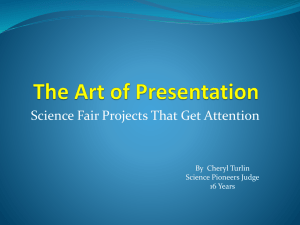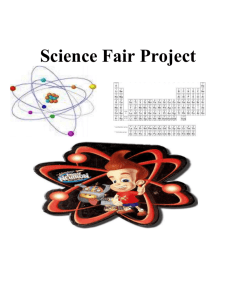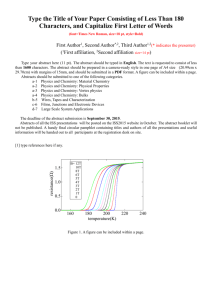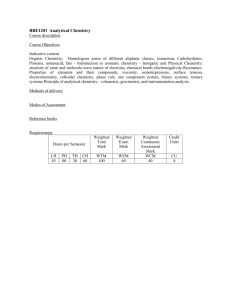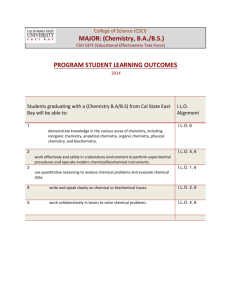PreAP SCIENCE 2
advertisement
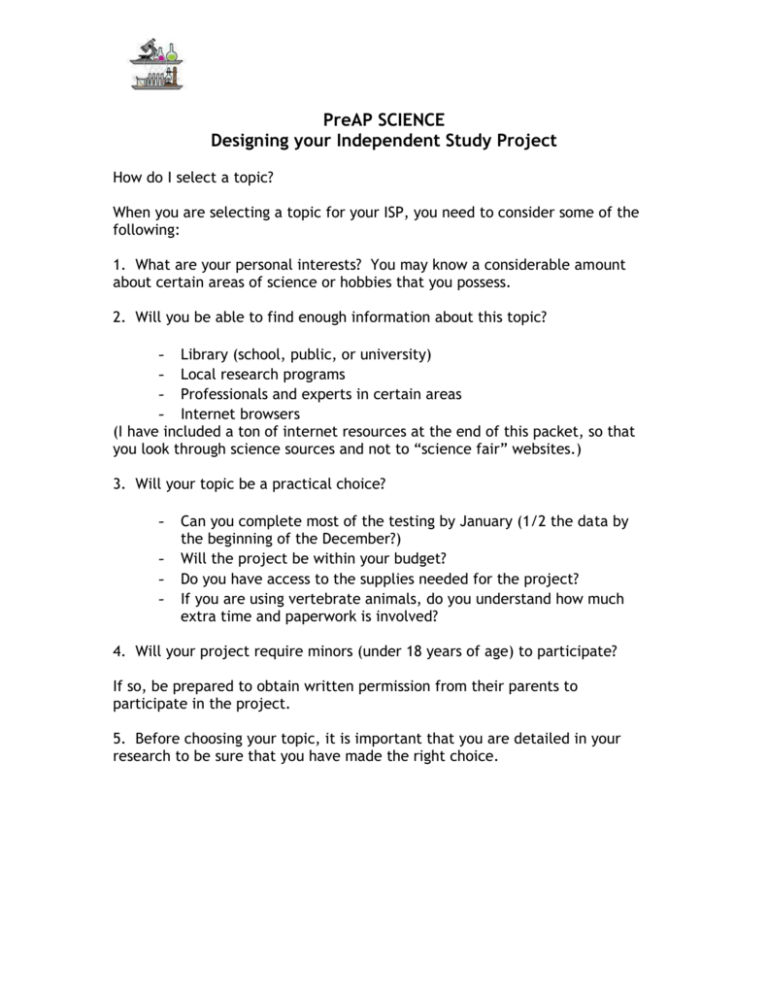
PreAP SCIENCE Designing your Independent Study Project How do I select a topic? When you are selecting a topic for your ISP, you need to consider some of the following: 1. What are your personal interests? You may know a considerable amount about certain areas of science or hobbies that you possess. 2. Will you be able to find enough information about this topic? - Library (school, public, or university) - Local research programs - Professionals and experts in certain areas - Internet browsers (I have included a ton of internet resources at the end of this packet, so that you look through science sources and not to “science fair” websites.) 3. Will your topic be a practical choice? - Can you complete most of the testing by January (1/2 the data by the beginning of the December?) Will the project be within your budget? Do you have access to the supplies needed for the project? If you are using vertebrate animals, do you understand how much extra time and paperwork is involved? 4. Will your project require minors (under 18 years of age) to participate? If so, be prepared to obtain written permission from their parents to participate in the project. 5. Before choosing your topic, it is important that you are detailed in your research to be sure that you have made the right choice. WHERE CAN YOU FIND UNIQUE DEAS FOR TOPICS? Links on the bottom of Mrs. Wildman’s website Books Newspapers Qualified Professionals Magazines Educational TV Consumer Report Science Fair Books Science Museums Internet Websites CATEGORIES FOR SCIENCE PROJECTS Listed below are the categories for individual project competition and a few examples of the types of projects that might be appropriate for each category. Perhaps seeing some examples of what fits into each category will give you a few ideas. Behavioral/Social Sciences Psychology, sociology, anthropology, archeology, ethiology, ethnology, linguistics, animal behavior (learned or instinctive), learning, perception, urban problems, gerontology, reading problems,., public opinion surveys, and education testing, etc. Biochemistry/Microbiology: Molecular biology, molecular genetics, enzymes, photosynthesis, blood chemistry, protein chemistry, food chemistry, hormones, bacteriology, virology, protozoology, fungal and bacterial genetics, yeast, etc. Botany: Agriculture, agronomy, horticulture, forestry, plant biorhythms, palynology, plant anatomy, plant taxonomy, plant pathology, plant genetics, hydroponics, algology, mycology, etc. Chemistry: Physical chemistry, organic chemistry (other than biochemistry), inorganic chemistry, materials, plastics, metallurgy, soil, chemistry, etc. Computers: New developments in software or hardware, information systems, computer systems organization, computer methodologies, and data (including structures, encryption, coding and information theory), etc. Earth/Space Sciences: Geology, geophysics, physical oceanography, meteorology, atmospheric physics, seismology, petroleum, geography, speleology, mineralogy, topography, optical astronomy, radio astronomy, astrophysics, etc. Engineering: Civil, mechanical, aeronautical, chemical, electrical, photographic, sound, automotive, marine, heating and refrigerating, transportation, environmental engineering, etc. Power transmission and generation, electronics, communications, architecture, bioengineering, lasers, etc. Environmental Science: Pollution (air, water, land), pollution sources and their control, waste disposal, impact studies, environmental alteration (heat, light, irrigation, erosion, etc.), ecology. Mathematics: Calculus, geometry, abstract algebra, number theory, statistics, complex analysis, probability, topology, logic, operations research, and other topics in pure and applied mathematics. Medicine/Health: Medicine, dentistry, pharmacology, veterinary medicine, pathology, ophthalmology, nutrition, sanitation, pediatrics, dermatology, allergies, speech and hearing, optometry, etc. Physics: Solid state, optics, acoustics, particle, nuclear, atomic, plasma, superconductivity, fluid and gas dynamics, thermodynamics, semiconductors, magnetism, quantum mechanics, biophysics, etc. Zoology: Animal genetics, ornithology, ichthyology, herpetology, entomology, animal ecology, anatomy, paleontology, cellular physiology, animal biorhythms, animal husbandry, cytology, histology, animal physiology, neurophysiology, invertebrate biology, etc. Protocol Papers 1. All students must have approval before starting experimenting. 2. Protocol papers will include: (these will be completed online this year) - your research plan (must include safety steps that you will follow) - bibliography (at least 5) APA format - parent signature - any other special forms that may be necessary 3. Projects with the following will need additional approval and form completion: - ALL HUMAN SUBJECTS (EVEN SURVEYS) ALL VERTEBRATE ANIMALS (A VETERINARIAN WILL NEED TO BE CONSULTED) IT IS NOT RECOMMENDED THAT MICE BE USED; HOWEVER, IF THEY ARE NECESSARY TO THE PROJECT THEY CANNOT BE OBTAINED FROM A PET STORE. (ONLY FROM LAB SUPPLY, BREEDERS, ETC.) ALL MICROORGANISMS (INCLUDING FUNGI) HAZARDOUS CHEMICALS (EVEN THOSE BOUGHT FOR HOME USE – PESTICIDES, POOL CHEMICALS, BLEACH, FERTILIZERS ETC.) HAZARDOUS EQUIPMENT (INCLUDING STOVES/OVENS, OPEN FLAMES, POWER TOOLS, LAWNMOWERS) Projects that include the above items will need approval not only from the teacher but also from a special district protocol committee. All forms will be completed and saved online. I will give you the website in which you register. Forms will not be reviewed or approved by the committee unless they are completely filled out and contain the appropriate signatures. Design of the Experiment The experiment needs to have a control, or standard to test your experimental results against. You will need a large sample size to be sure the experiment is accurate. Any human surveys need at least 100 people. If human subjects are participating in the experiment there should be between 25-50 people. If plants are to be used you will need as many as possible in each group. Allow enough time for the experiment to be repeated. Also, if things don’t go right the first time you might need to start your experiment over again. BEGIN EARLY!!! Keep a detailed notebook (journal) Please use a different notebook than your ISN. You should start now, with your 10 ideas. All entries should be dated and a log kept of what was done that day along with any data obtained. All measurements must be done in metrics. EXACT amounts of all substances must be shown. You will not get approval of using chemicals unless you show these amounts. If seeds are to be used in your experiment plan to start EARLY! You must know how long it will take for them to germinate. You must plan extra time in case they do not germinate and you have to start over. If you are not actually testing the seed itself, it is best to start with small plants from a nursery. Living organisms WILL most likely die if you are not used to taking care of them. If ordering insects and other invertebrates from biological supply companies be sure to order EARLY and be prepared to reorder more if necessary. Writing the Procedure Do not just go to a website for a project and just pick one that stands out! Background research needs to be done first. The procedure must be so detailed that another person could do the experiment by reading it! The depth and complexity of the project will be considered in the final grading. The procedure will be a list of numbered steps. It will be written in third person – no “I” or “you.” Amounts of all substances must be listed – especially chemicals. These amounts can be changed as the project progresses if necessary. A way to quantitatively (using numbers) measure the results must be included. No project will be approved if there is not a way to quantitatively measure the results. If you are building something, then plans or diagrams must be included. The procedure should allow for a long-term project where data collection occurs over a 6-8 week period. PROJECTS NOT TO DO: (any that are frequently done) Too elementary - Do colored lights affect plant growth? - Which substance makes a plant grow fastest (water, Coke etc.)? - Which toothpaste gets an eggshell whitest? - Which mouthwash/hand soap kills the most bacteria? Too overdone - Does fertilizer affect the growth of plants? - What factors affect a model rocket? - What affects a bean plant’s growth? - Which color, size, shape, picture etc. affects memory? - How does much affect…? Doesn’t allow for experimental design - How do tornadoes form? - How does a television work? Never good to begin with - Which type of music do plants like best? (Botanists will tell you that plants do not have a nervous system or any way of distinguishing types of music.) Vertebrate animals may not be used unless you will be working with a veterinarian as a mentor. Product testing will not be approved (No brand testing.) - Which brand of batteries lasts longest? You will need to use Brand A, Brand B, etc. Keep this in your binder under the ISP info link, because this is a great resource in which to refer during the entire process. Here are some links in which you can start researching your ideas/ problems (Science Fair and EDC) http://www.fi.edu/learn/hotlists/sciencenews.php - Start here! There are links to lots of good sites from this one! http://www.sciencenews.org/ http://www.sciencedaily.com/ http://www.sciencenewsforkids.org/ http://www.newscientist.com/ http://www.nytimes.com/pages/science/ http://www.popsci.com/ http://www.eurekalert.org/ http://discovermagazine.com/ http://www.world-science.net/ http://www.nature.com/ http://dsc.discovery.com/ http://www.nsf.gov/news/ Starting with what is going on in the world of science is really the way to get the best ideas, but sometimes it helps to see what others have done for projects in the past. I do NOT want you copying a project, but it can help lead to better ideas of your own. Some science fair sites to check out: http://www.stemnet.nf.ca./sciencefairs http://www.sciencenewsforkids.org/pages/sciencefairzone/topics.asp http://www.all-science-fair-projects.com http://dir.yahoo.com/Science/Education/K_12/Fairs_and_Competitions/Projects_and_Ideas/ http://www.juliantrubin.com/fairprojects.html http://mathforum.org/teachers/mathproject.html http://www.all-science-fair-projects.com/category0.html http://othello.mech.northwestern.edu/~peshkin/scifair/chias_ideas.html http://www.tryscience.org/ http://parentingteens.about.com/cs/homeworkhelp/a/blscproindex.htm http://www.ars.usda.gov/is/kids/fair/ideasframe.htm http://www.energyquest.ca.gov/projects/index.html This takes TIME! Allow yourself time to search. Coming up with a project idea is often the hardest part of the whole process. Remember: Write down everything you do and where you went in your journal. This will save you time from backtracking. More sources: This list comes from the Houston Science fair website: SEFH Internet Resources Science Fair Resources http://www.scifair.org (main site for the INTEL ISEF) http://www.showboard.com (good source for SEFH display boards) http://www.madsci.org (good source for common questions about SEF) http://hunstem.uhd.edu/ (provides links to many resources) http://www.nsta.org/ http://www.ipl.org/youth/projectguide http://www.madsci.org/libs/areas/reagents.html http://www.lib.lsu.edu/sci/chem/internet /science_fairs.html http://www.usc.edu/cssf/resources/ http://www.educationplanet.com/sciencefair.html http://www.chipublib.org/008subject/009scitech/scifair.html http://teams.lacoe.edu/documentation/places/science/sciencefair.html http://exploratorium.edu/ls/pathfinders/scifairs/ http://www.us.net/mccpta/science.html http://cusef.byu.edu/Science%20Fair%20Resources/resources.htm http://www.saludak-12.org/scifair.htm http://www.hamiltonschools.org/davies/sciencefairrefs.htm http://www.saluda.lib.sc.us/science.html http://sciencepage.org/scifair.htm http://www.wheaton.lib.il.us/library/scifair.html http://askeric.org/Projects/Newton http://school.discovery.com/sciencefaircentral Project Ideas http://users.massed.net/~tedrowan/primer.html http://sciencefairproject.virtualave.net/ http://www.cmste.uregina.ca/scifair.html Science Fairs http://sciencefairproject.virtualave.net http://istf.ucf.edu http://www.drexel.edu/dvsf/ Presentation and Evaluation http://school.discovery.com/sciencefaircentral/scifairstudio/handbook/presandeval.html Others http://www.sciencedaily.com http://www.enn.com http://www.newscientist.com http://www.familyeducation.com/article/0,1120,1-3600,00.html http://homeworkspot.com/sciencefair/ http://ipl.org/youth/projectguide http://youth.net/nsrc/sci/sci.index.html http://www.chem4kids.com
